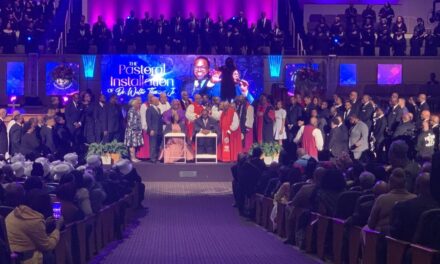By Maxine Johnson Wood, Ed.D.,
Special to the AFRO
Martin Luther King Jr.’s national holiday was signed into law by President Ronald Reagan in 1983. It was first observed in 1985, and has remained significant in that only one other American–George Washington– has been honored in this way.
The annual observance provides opportunities for diverse recognitions and renewed remembrances as well as new perspectives on the life, leadership and impact of this most significant influence in the civil rights movement. King made history during his lifetime. He continues to do so almost 55 years since his assassination April 4, 1968.
An inspiring, trained, well-prepared preacher, gifted speaker recognized for his wisdom and intellect, King motivated people and solicited their involvement in the challenging civil rights work. His pivotal “I Have A Dream” speech, delivered at the March on Washington Aug. 28, 1963, became a mantra for those involved in the movement, and encouraged multitudes, giving them hope, moving them to actions. Prior to this speech and certainly following it, King’s words expressed his goals for responding to the needs present during those segregated, separated, unequal Jim Crow times. His words, writings and actions continue to reverberate through generations.
Formal and informal research and reviews of documents and data focusing on King’s writings, commentaries and speeches offer many explanations, rationales, advisements and theories. They reveal his beliefs, reflect his proposed actions, as well as his own assessments of needs, successes and failings when addressing civil rights, human rights and issues of racism and inequality. His words were often followed by actions, resulting in some desired changes. Through the years, observers and supporters have listened and responded to his clarion call.
As time passes, the levels of familiarity and memories may fade due to the declining numbers of contemporaries of King. In my thinking, this results in the need to revisit messages from him that generated actions and created climates for change in entrenched conditions and behaviors. Problems that he focused on have continued, and in some instances, have grown. This may be the right time to give prominence to the very powerful tool possessed and used throughout King’s work in civil rights. That tool was to use words to stimulate followers to action.
As 2023 begins, we realize the impact of such pervasive events as COVID-19, diminished interpersonal relationships, isolation, increased awareness of overt racism, documented social and emotional needs of all ages, races, genders, socio-economic levels, absences and limitations in parenting and character education. Martin Luther King Jr.’s capacity for motivating others was seldom questioned. My goal is a renewed recognition of the power of King’s capacity to spark and inspire others to action, based on the words and the message.
I choose to encourage renewed interest in using King’s words to move supporters to action.
We are being reminded that the phrase, “the time is always right to do right,” can create an atmosphere for effective and significant actions. It was delivered by King during his speech, “The Future of Integration,” given on Oct. 22, 1964 at Oberlin College in Ohio to an audience of 2,500 students, staff and visitors.
The college had a history of activism and involvement in the civil rights movement. The speech was offered after King received the Nobel Peace prize, and a period of unrest that included the assassination of President John F. Kennedy, a number of riots in cities, the deaths of three civil rights workers in Mississippi, as well as approaching national elections. There have been varied discussions and reviews of the significance of this quote. Some examples exist of the use and misuse by others over the years, with political figures using it for purposes unrelated to King’s clear intention to spur awareness and sensitivity and encourage action.
This direct advice to those in attendance, as well as those who listened on WOBC radio, was a rallying call. King’s “I Have a Dream” speech was the epitome of such, and retains its capacity to continue to do so.
I believe that, “the time is always right to do what is right,” becomes significant in response to current issues requiring and warranting action. There is a practical, yet persistent need to acknowledge the model for action King demonstrated, displayed and freely used, as he sought practical, earnest and often simplistic ways to encourage and applaud action among people of all ages and genres.
It is fitting as we recognize the power of King’s words to move others to action.
This national Martin Luther King Jr. holiday is a timely and appropriate way to endorse the U.S. Congress’ declaration of it as “a day of service”— the only national holiday with such a designation. How fitting to do so, being moved to action in King’s honor, realizing that “the time is always right to do what is right.”
Maxine Johnson Wood, Ed.D., is a retired Pre-K–12 educator, and college and university administrator.
The opinions on this page are those of the writers and not necessarily those of the AFRO. Send letters to The Afro-American • 233 E. Redwood Street Suite 600G
Baltimore, MD 21202 or fax to 1-877-570-9297 or e-mail to editor@afro.com
Help us Continue to tell OUR Story and join the AFRO family as a member –subscribers are now members! Join here!
The post On Martin Luther King Jr.’s national holiday, the time is always right to do what is right appeared first on AFRO American Newspapers .











